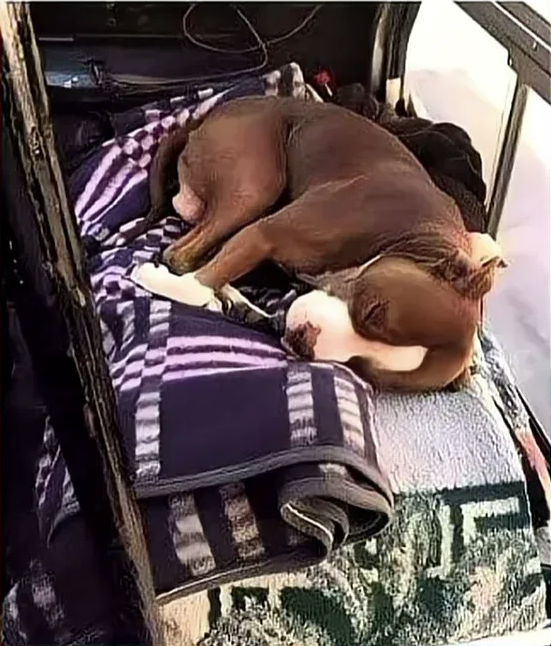
The bus driver never leaves home without his dog. Every single day, the pup rides along, curled up in his usual spot near the driver’s seat. It’s routine, comfortable, the kind of companionship that makes long shifts feel less lonely.
One day, a passenger complained. Called it unsanitary. Demanded the dog be removed. Said it was unprofessional, inappropriate, against regulations probably.
The driver didn’t argue. Didn’t try to explain or justify or defend himself. He simply stopped the bus and said he would never leave his dog alone.
Then he added the words that explain everything: “To him, this isn’t just a pet. This is his son.”
The photo shows the dog—a brown, medium-sized mixed breed—curled up peacefully on a blanket on the passenger seat. His head rests on his paws, completely relaxed, comfortable in his spot. This is clearly where he belongs, where he’s meant to be.
The driver’s declaration—”this is his son”—transforms the entire situation. This isn’t about whether pets should be allowed on buses. This is about a man who views his dog as family, who refuses to treat him as optional or disposable, who will stop his entire route rather than leave his companion behind.
“He would never leave his dog alone.” Not for convenience. Not for passengers’ complaints. Not for money or regulations or social pressure. His dog comes with him or he doesn’t go.
There’s something beautiful in that absoluteness. In a world that often treats animals as accessories or lesser beings, this bus driver draws a line: this is my son, and I don’t abandon my son.
The passenger who complained probably didn’t understand. Probably thought “it’s just a dog” and wondered why the driver couldn’t just leave him at home like normal people do with pets. But that’s exactly the point—this isn’t a normal pet-owner relationship. This is family.
The dog looks completely at peace in his spot. He’s not anxious or disruptive. He’s not bothering passengers or creating problems. He’s just… there. Existing alongside his human, providing companionship, being loved.
For the driver, that presence probably makes impossible days bearable. Long hours driving the same routes, dealing with difficult passengers, navigating traffic and schedules and all the stress that comes with public transportation. And through it all, his son is there. Quiet. Steady. Present.
The driver’s refusal to negotiate is powerful. He didn’t try to compromise, didn’t offer to leave the dog home tomorrow, didn’t apologize for having him there. He simply stated his truth: I will never leave my dog alone. This is my son.
That statement challenges everyone who hears it to examine their own relationships with animals. Do we view them as possessions or family? As optional or essential? As things we keep when convenient or beings we commit to unconditionally?
This bus driver has made his position clear. His dog isn’t a pet that can be left behind when someone complains. He’s family. He’s a son. And family doesn’t get abandoned because it’s inconvenient.
The photo could be from anywhere—the interior of a bus with the dog peacefully sleeping on his blanket. But paired with the story, it becomes something more significant. It becomes evidence of a bond that refuses to be broken by social norms or passenger complaints.
The driver stopped the bus. Made his declaration. And presumably, either the complaining passenger accepted the situation or found another way to travel. Because this driver wasn’t changing his mind.
To him, this isn’t just a pet. This is his son. And sons don’t get left behind.